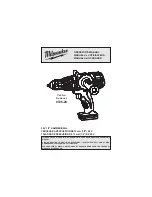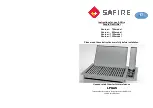
2
English
dangerous in the hands of untrained users.
e.
Maintain power tools. Check for misalignment
or binding of moving parts, breakage of parts
and any other condition that may affect the
power tools operation. If damaged, have the
power tool repaired before use.
Many accidents
are caused by poorly maintained power tools.
f.
Keep cutting tools sharp and clean.
Properly
maintained cutting tools with sharp cutting edges
are less likely to bind and are easier to control.
g.
Use the power tool, accessories and tool bits
etc., in accordance with these instructions and
in the manner intended for the particular type
of power tool, taking into account the working
conditions and the work to be performed.
Use
of the power tool for operations different from
intended could result in a hazardous situation.
5. SERVICE
a.
Have your power tool serviced by a qualified
repair person using only identical replacement
parts.
This will ensure that the safety of the power
tool is maintained.
SPECIAL SAFETY RULES
Wear ear protectors.
Exposure to noise can cause
hearing loss.
Use auxiliary handles supplied with the tool.
Loss
of control can cause personal injury.
If operation is dusty, also wear a dust mask.
Hold power tool by insulated gripping surfaces
when performing an operation where the cutting
accessory may contact hidden wiring or its own
cord.
Cutting accessory contacting a “live” wire may
make exposed metal parts of the power tool “live” and
could give the operator an electric shock.
This appliance is not intended for use by persons
(including children) with reduced physical,
sensory or mental capabilities, or lack of
experience and knowledge, unless they have been
given supervision or instruction concerning use
of the appliance by a person responsible for their
safety. Children should be supervised to ensure
that they do not play with the appliance.
This appliance is not intended for use by young
children or infirm persons. Adequate supervision by a
responsible person must be provided to ensure that
they do not play with the appliance.
Keep children and visitors away.
Visitors should
wear safety glasses and be kept a safe distance from
work area. Do not let visitors contact tool or extension
cord.
Complies with AS/NZS 60745.
Recommended for the use of a residual current device
with a rated residual current of 30 mA or less.
SAFETY PRECAUTIONS
IMPORTANT
To protect yourself from the risk of electric shock, injury
and fi re when using an electric tool, it is imperative to take
the following basic safety precautions. Before you use
your tool, read these instructions carefully and make sure
that you understand them thoroughly.
Make sure that the supply voltage (Volts) used
corresponds to the voltage marked on the tool's rating
plate.
When using cable drums, run all the cable off the
drum. Minimum cable across section: 1.0 mm.
When using the electric hammer drill outdoors,
connect it to an outdoor-grade extension cable type
H07RN-F 2G, 1.0 mm and rain-water-protected plugs
in proper working order.
Make sure of your footing when drilling freehand.
Before drilling, use a line detector to locate concealed
electric, water or gas lines in walls. Avoid touching live
components or conductors.
Wear goggles and use a dust mask on jobs generating
dust.
Wear ear protectors.
Exposure to noise can cause
hearing loss.
Do not use your hammer drill near flammable liquids
or gases.
Always pull the plug out of the socket before cleaning
your tool or changing accessories.
Keep the power cable in good condition. Oil and acid
can damage the cable.
Never overload the tool.
Make sure your workplace is safe.
IMPORTANT
It is imperative to follow all national safety regulations
concerning installation, operation and maintenance of
the tool.
If incorrectly fitted, chisel bits and drill bits may be flung
out of the tool accidentally and cause serious injury.
Before you start using your hammer drill, always check
that the chisel or drill bit is properly locked in the chuck.
Examine the chuck regularly for signs of wear or



























